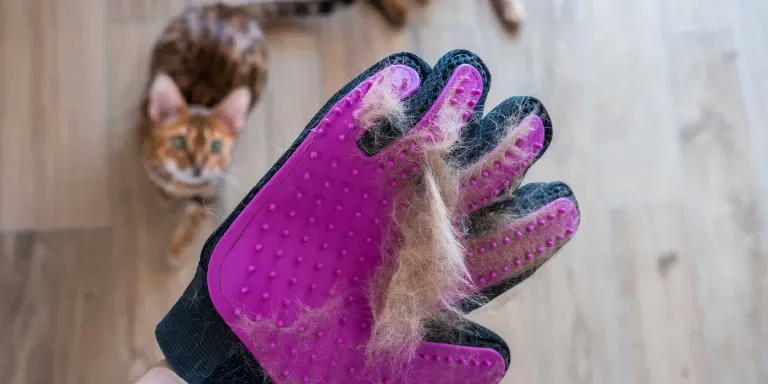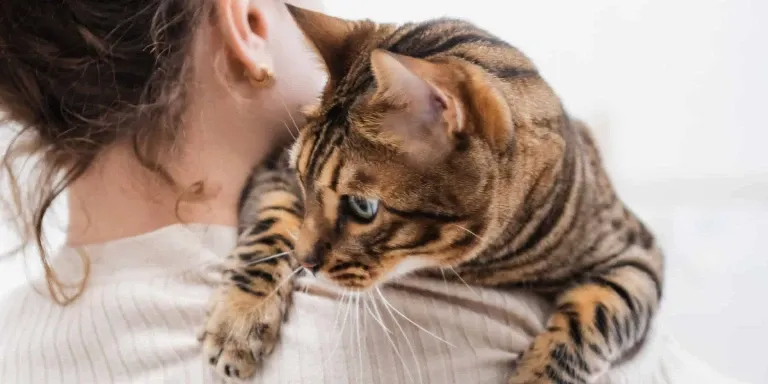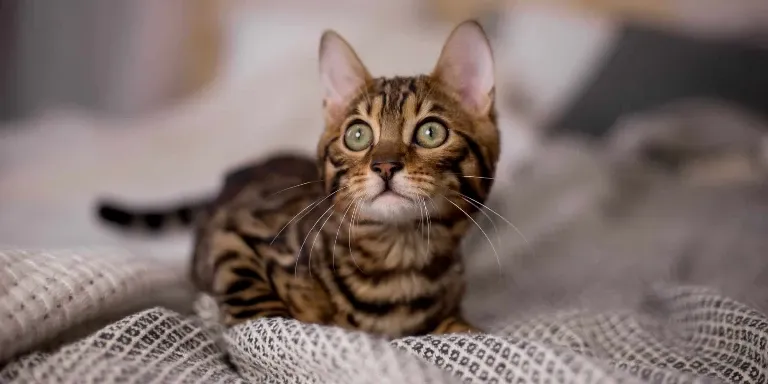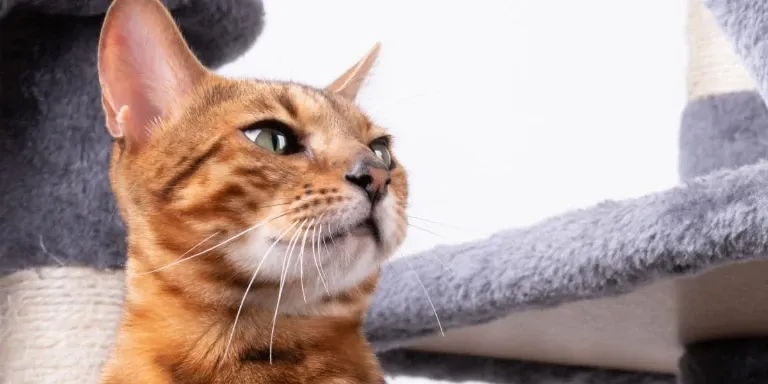The Best Fluffy Pancakes recipe you will fall in love with. Full of tips and tricks to help you make the best pancakes.

Are you looking for a feline companion that’s exotic, energetic, and full of personality? If so, a Bengal cat might catch your eye. These hybrid cats, bred from domestic cats and Asian leopard cats, are known for their striking appearance, playful nature, and intelligence.
But before you decide if a Bengal cat is the right fit for your household, it’s essential to understand their unique needs and characteristics. Like a wild tiger prowling through the jungle, a Bengal cat brings a sense of adventure and excitement to your home. With their bold markings, muscular build, and agile movements, they exude a sense of power and grace.
Bengal cats can make great house pets for the right owner. They are known for their intelligence, playfulness, and loyalty. However, they also have a lot of energy and can be highly active, so they may not be the best fit for someone who wants a more laid-back companion.
They also require a lot of attention and interaction, so owners should be prepared to spend time playing and engaging with their Bengal cat.
Beneath their wild exterior, they are loyal, affectionate pets that thrive on human interaction and attention. If you’re ready for a feline companion that’s a little bit wild and a whole lot of fun, a Bengal cat might just fit the bill.
Overview of Bengal Cats as a Hybrid Breed
If you’re looking for a unique and energetic feline companion, a Bengal cat might just be the perfect addition to your household! As a hybrid breed, Bengal cats are a cross between a domestic cat and an Asian leopard cat. This unique breeding results in a cat with a distinctive coat pattern, muscular build, and high energy levels.
When it comes to Bengal cat behavior, they’re known for being highly intelligent, curious, and playful. They love to climb, explore, and engage in interactive play with their owners. However, their high energy levels can sometimes lead to destructive behavior if they’re not given enough stimulation and attention.
In terms of temperament, Bengal cats are often described as affectionate, loyal, and social. They love to be around their owners and are known to form strong bonds with them.
Overall, if you’re looking for a cat that’s both unique and highly active, a Bengal cat might be the perfect fit for your household.
Pros of Owning a Bengal Cat
If you’re considering getting a Bengal cat, there are several pros to keep in mind. First and foremost, these cats are known for their affectionate personalities and love for their owners.
Additionally, they have a playful nature and enjoy interactive playtime with their human family members.
Finally, their unique appearance, with their wildcat-like markings and stunning coats, make them a stunning addition to any household.
Affectionate Personalities
Bengal cats have such loving personalities that they’ll steal your heart in no time. These felines are known for being extremely affectionate towards their owners and love nothing more than spending time with them. They’re often described as being dog-like in their behavior, following their owners around the house and even playing fetch.
Bonding experiences with your Bengal cat can be created through training techniques such as clicker training, which can help strengthen your relationship and build trust between you and your pet.
This breed is also known for being very vocal, often meowing to get your attention or to simply engage in conversation. Their playful and loving nature makes them great companions for those who want a pet that will show them affection and provide them with constant entertainment.
Playful Nature
With their energetic and mischievous personalities, Bengal cats are always ready for a game. They love interactive play and will spend hours chasing toys, climbing cat trees, and exploring their surroundings.
This makes them an excellent choice for anyone looking for a fun-loving and playful companion. In addition to providing endless entertainment, playing with your Bengal cat is also a great way to bond with them. These cats thrive on human attention and love nothing more than spending time with their favorite people.
Whether you’re tossing a ball or engaging in a game of hide-and-seek, interactive play is a great way to build a strong and lasting relationship with your feline friend. So if you’re looking for a pet that will keep you on your toes and bring joy to your life, a Bengal cat might just be the perfect choice for you.
Unique Appearance
You’ll love how distinct their appearance is, with their striking coat patterns and muscular build that sets them apart from other felines. The Bengal cat is a result of breeding domestic cats with the wild Asian leopard cat, which gives them their unique appearance.
They have a soft, short coat that is covered in spots or marbling that can come in a variety of colors, including brown, silver, and snow. Their eyes are large and expressive, and their ears are small and rounded, which adds to their wild appearance.
In terms of grooming, Bengal cats are relatively low maintenance. They have a short coat that doesn’t require much brushing, and they are known for being fastidious groomers themselves. However, it’s still important to regularly check their coat for any matting or tangles, especially if they have longer hair.
Additionally, as with all cats, it’s important to regularly trim their nails and clean their ears to prevent any infections. Overall, the Bengal cat’s unique appearance adds to their charm and makes them a fascinating addition to any household.
Cons of Owning a Bengal Cat
Although they’re affectionate, Bengal cats may be too high-energy for some households. These cats have a natural instinct to explore and play, which can lead to excessive energy in the home.
If you don’t have the time or energy to constantly entertain your Bengal cat, they may become bored and destructive. This can lead to furniture damage and other unwanted behaviors.
Another potential challenge of owning a Bengal cat is their litter box habits. These cats tend to be very particular about their bathroom habits and may refuse to use a dirty litter box.
This means that you’ll need to clean their litter box frequently to ensure that they’re happy and healthy. If you’re not prepared to commit to this level of care, a Bengal cat may not be the best fit for your household.
Understanding Their Unique Needs
To fully accommodate your new Bengal cat, it’s important to understand their specific needs and tendencies.
One of the first things to consider is their feeding requirements. Bengals have high metabolisms and require a diet that is high in protein, so it’s important to choose a high-quality cat food that meets their nutritional needs. You may also want to consider feeding your Bengal a raw food diet, as this can provide them with the nutrients they need to stay healthy.
In addition to their feeding requirements, it’s also important to understand the exercise needs of a Bengal cat. These cats are highly energetic and require plenty of playtime and exercise to stay healthy and happy.
Providing your Bengal with plenty of toys and playtime can help keep them active and engaged, while also preventing destructive behavior. You may also want to consider creating a dedicated play area for your Bengal, complete with climbing structures and scratching posts, to help them burn off excess energy and stay entertained.
By understanding the unique needs of your Bengal cat, you can provide them with the care and attention they need to thrive in your home.
Training and Socialization
Training and socialization are crucial for shaping your new Bengal cat’s behavior, like molding clay on a potter’s wheel. Positive reinforcement is an effective way to teach your cat new behaviors and reinforce good ones. Common positive reinforcement techniques include offering treats, praise, or toys as a reward for good behavior.
It’s important to avoid punishing your cat, as this can lead to fear and aggression. Instead, focus on rewarding desired behaviors and redirecting unwanted ones. Socializing techniques can also play a big role in your Bengal cat’s behavior.
Early socialization can help your cat feel comfortable around people, other animals, and new environments. Start by introducing your cat to different sounds, smells, and sights when they’re young, and gradually expose them to new experiences as they grow. Behavior modification and training techniques can help address any behavioral issues your cat may have, such as excessive scratching or biting.
With patience and consistency, you can help your Bengal cat develop positive behaviors and enjoy a happy life as a house pet.
Health Concerns and Medical Needs
Taking care of your new furry friend’s health needs should be a top priority, so it’s important to educate yourself on potential health concerns and necessary medical treatments. Bengal cats are generally healthy, but like all cats, they can develop certain conditions. Here are some common health concerns to watch out for:
- Hypertrophic cardiomyopathy: This is a heart disease that is common in Bengal cats. Make sure to have your cat’s heart checked regularly by a veterinarian.
- Flat-chested kitten syndrome: This is a condition that can occur in young Bengal kittens. It’s important to provide them with a flat surface to lay on and to monitor their breathing.
- Progressive retinal atrophy: This is an eye disease that can cause blindness. It’s important to have your cat’s eyes checked regularly by a veterinarian.
Preventative care is essential for keeping your Bengal cat healthy. This includes regular check-ups, vaccinations, and parasite prevention. Make sure to keep your cat up-to-date on all necessary vaccinations and to provide them with flea and tick prevention.
By staying on top of your cat’s medical needs, you can help ensure a long and healthy life for your beloved pet.
Remember, while caring for your Bengal cat’s health is important, it’s also important to give them the freedom to explore and play. Provide them with plenty of toys and opportunities to climb and scratch, and make sure they have enough space to move around.
With a little bit of care and attention, your Bengal cat can be a happy and healthy addition to your family.
Choosing a Bengal Cat
When choosing a Bengal cat as a pet, there are several key points to consider. First, it’s important to find a reputable breeder who can provide documentation of the cat’s health and lineage.
Alternatively, adoption and rescue options are available for those who want to give a loving home to a cat in need.
If you already have cats at home, it’s important to consider the personalities and temperaments of all cats involved before bringing a Bengal into a multi-cat household.
Finding a Reputable Breeder
If you’re looking to add a Bengal cat to your household, make sure to research and choose a reputable breeder who prioritizes the health and well-being of their cats.
A good breeder should have the necessary qualifications, such as being registered with a cat breeding organization and having proper veterinary care for their cats.
Ask to see the breeder’s facilities and meet the parents of the kitten you’re interested in to ensure they’re healthy and well-cared for.
Pricing factors should also be considered when choosing a breeder. While it may be tempting to choose a breeder who offers lower prices, this could be a red flag for lower quality breeding practices or poor health in the cats.
A reputable breeder may have higher prices due to the cost of proper care and breeding practices, but it’s worth it in the long run for a healthy and happy cat.
Do your research and choose a breeder who’s transparent about their pricing and breeding practices to ensure the best possible outcome for you and your new furry friend.
Adoption and Rescue Options
Now that you know how to find a reputable breeder for a Bengal cat, you may be wondering about other options for bringing one into your home. One of those options is adoption or rescue.
While many people may prefer to purchase a kitten from a breeder, there are many Bengal cats in need of loving homes that can be found through adoption or rescue organizations.
When considering adoption or rescue, it’s important to understand the differences between the two. Adoption usually refers to cats that have been surrendered by their previous owners or found as strays, whereas rescue organizations often take in cats from high-kill shelters, abusive situations, or other dangerous environments.
Regardless of which option you choose, it’s important to research the organization thoroughly and ensure that they are reputable and have the cat’s best interests in mind. Additionally, it’s important to consider the temperament of the cat, as some rescue cats may have a history of trauma or abuse that could impact their behavior.
However, with patience and love, many rescued Bengal cats can make wonderful house pets.
Considerations for Multi-Cat Households
Adding a feline friend to your household? Here are some things to keep in mind for a harmonious multi-cat home.
When introducing new cats, it’s important to do so gradually. This means keeping the cats separate in different rooms at first, allowing them to sniff each other’s scent through the door. Once they seem comfortable with each other’s presence, you can slowly introduce them in a controlled environment.
Keep in mind that some cats may never become best friends, but as long as they can coexist peacefully, that’s a good outcome.
Managing territorial behavior is also important in a multi-cat household. Providing multiple resources such as litter boxes, food bowls, and beds can help minimize competition and territorial disputes.
It’s also important to give each cat their own space where they can retreat and feel safe. If you notice any signs of aggression or tension, it may be helpful to consult with a veterinarian or animal behaviorist for further guidance.
With patience and proper management, a multi-cat household can be a happy and harmonious environment for all feline residents.
Do Bengal Cats’ Sleeping Habits Make Them Suitable as House Pets?
Bengal cat sleep patterns can make them suitable as house pets. These cats are known for their ability to adapt to their owner’s lifestyle and can be active during the day and rest at night. Their sleeping habits can make them a great fit for households with busy schedules.
Conclusion
Overall, Bengal cats can make great house pets as long as their unique needs are met and they’re properly trained and socialized. They’re intelligent, playful, and affectionate cats that can bring a lot of joy to their owners. However, it’s important to note that they’re a hybrid breed and may exhibit some wild behaviors, such as climbing and jumping high, which can be challenging in some households.
Interestingly, a study conducted by the University of California, Davis found that Bengal cats were more likely to suffer from hypertrophic cardiomyopathy (HCM) than other domestic cat breeds. HCM is a serious and potentially life-threatening heart condition that requires monitoring and treatment. This statistic highlights the importance of regular veterinary check-ups and being aware of potential health concerns when owning a Bengal cat.
With proper care and attention, Bengal cats can make wonderful companions for many years to come.








